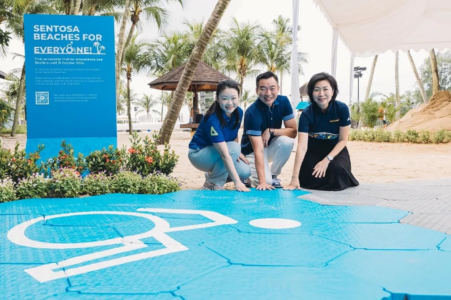How inclusive representation in media can redefine narratives for people with disabilities.
SINGAPORE: A man in a wheelchair gazes out at a scene of distant trees and buildings, his face blank, tinged with sadness. This is a typical portrayal of a person with disabilities (PWDs) in media—isolated, helpless, and dependent on others.
This misrepresentation is one of the many challenges PWDs face in the entertainment industry, says filmmaker Zareena Nazimuddin (“Reena”), who has dyslexia. “PWDs barely have representation in the media, and when they do, it’s often inaccurate or reductive,” she asserts.
Challenging Norms
The lack of authentic roles for PWD actors in Singapore’s media landscape is glaring. While a few actors, like Timothy Lee in Kin, have made breakthroughs, most disabled characters are played by able-bodied actors, often reducing disabilities to a plot device.
For aspiring actress Jade Ow, who has moderate to severe hearing loss, this bias creates barriers. “After so many rejections in auditions, I wanted to give up on my dream,” she confesses.
Reena, however, is determined to change the narrative. Her film, The Damned Ones, is a supernatural thriller that features an entirely disabled cast—not in roles focused on their disabilities, but as complex characters in a gripping plot.
Representation Beyond Disabilities
In The Damned Ones, Jade plays Laura, a university student navigating a disappearance mystery. The film acknowledges disabilities without making them the sole focus, an approach Reena believes is key to fostering inclusivity.
“The greatest hurdle for actors with disabilities is society’s stubborn refusal to see them beyond their conditions,” she says.
For Amanda Yip, who has progressive vision loss, the opportunity was empowering. “Being disabled doesn’t mean we can only act as decorative props,” she asserts.
Breaking Barriers
PWD actors in Singapore face systemic challenges, from limited training opportunities to inaccessible audition processes. Jade recalls being dismissed due to her speech, affected by her hearing condition.
Reena’s production counters these barriers by accommodating her cast’s needs, including improvisation and flexibility on set. Despite a modest budget, the film earned accolades, including recognition at the Pokka Film Festival, demonstrating the untapped potential of PWD actors.
A Call for Change
Peter Sau of ART:DIS emphasizes the need for structural changes, from accessible training programs to accommodations on set. “We want trained, quality performers with disabilities who can represent their community authentically,” he says.
Globally, films like CODA and Sound of Metal showcase the power of inclusive casting, earning critical acclaim and sparking conversations about representation. Singapore’s media industry has much to gain by embracing similar practices.
As Jade puts it, “Treat PWDs as people, not just their disabilities.”
With efforts like The Damned Ones, Singapore takes a step towards inclusivity, but the journey is far from over. Accurate representation and opportunities for PWDs can enrich the industry and redefine societal perceptions, one story at a time.








